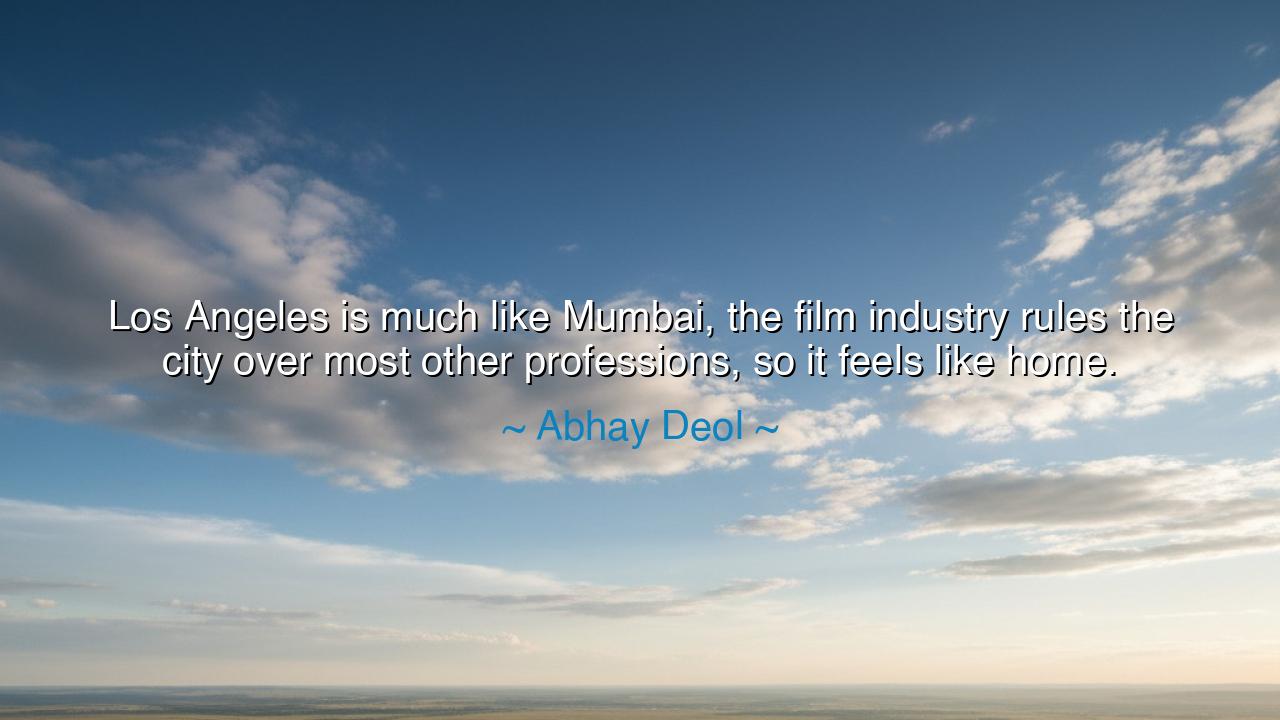
Los Angeles is much like Mumbai, the film industry rules the city
Los Angeles is much like Mumbai, the film industry rules the city over most other professions, so it feels like home.






“Los Angeles is much like Mumbai, the film industry rules the city over most other professions, so it feels like home.” Thus spoke Abhay Deol, a wanderer between worlds, an artist whose gaze bridges the East and the West. Beneath these simple words lies a deep reflection on belonging, identity, and the unifying power of art. To the casual listener, it may sound like a comment on cities and cinema—but to the thoughtful ear, it is a meditation on the universality of creative life, and how the spirit of art creates kinship across oceans. Deol’s statement is not merely geographical; it is spiritual. It speaks of finding “home” not in soil or language, but in the shared heartbeat of imagination that pulses wherever creation thrives.
When he says that Los Angeles is much like Mumbai, Deol is not comparing skylines or climates, but cultures—the way both cities orbit around the sun of their film industries. Each is a citadel of dreams, built upon ambition and illusion, where stories are the currency and fame the altar. In Mumbai, the city of Bollywood, film is not merely entertainment—it is identity, aspiration, and escape. In Los Angeles, the cradle of Hollywood, it is the same. Thus, in these cities, the artist finds a mirror of his soul. The same hunger burns, the same striving for immortality through image and sound. The actor, the writer, the dreamer—all are pilgrims to the same temple of creation, whether in the East or the West.
This truth, though modern in its expression, is as old as civilization itself. In the days of the ancients, there were also cities of art—Athens, where philosophy and drama ruled the spirit of Greece; Florence, where painters and sculptors shaped the Renaissance; Paris, the muse of poets and revolutionaries. In each age, there arises a place where imagination becomes industry, and art shapes the destiny of millions. The people of such cities breathe a different air—one charged with ambition, beauty, and chaos. Deol, who has walked the streets of both Mumbai and Los Angeles, recognizes this sacred sameness: that wherever art reigns, it builds not just an economy, but a culture—a kingdom of visionaries united by the pursuit of expression.
Yet, within his observation lies also a note of nostalgia. For to feel “at home” in two cities is to belong fully to neither. The artist is a traveler between worlds, always seeking, never settled. Deol’s words echo the ancient dilemma of the creative soul: to be bound not by land, but by the calling of art. Like Odysseus, the hero who sailed between realms, or Tagore, who wrote of a borderless world of the spirit, the artist finds home not in one place, but in the resonance of familiar dreams wherever he goes. Thus, when Deol speaks of feeling at home in Los Angeles, it is not geography he recognizes—it is the human condition of creation, the shared madness and magic of those who dare to turn visions into reality.
There is also wisdom here about the power of common purpose. The film industry, whether in Mumbai or Los Angeles, unites thousands—actors, directors, laborers, musicians, and dreamers—all bound by a single pursuit: to tell stories that move hearts. In such a place, hierarchy fades before the fire of creation. The janitor who sweeps a studio floor and the actor who stands beneath the lights both serve the same sacred goal—to breathe life into a story. Thus, Deol’s quote reminds us that true kinship is found not in blood or birth, but in shared devotion. Wherever people gather to serve beauty, that place becomes home.
Consider, too, the journey of Charlie Chaplin, who rose from the poverty of London to become the laughter of the world. When he arrived in Hollywood, he found not merely work, but a world that spoke his language—one of performance, imagination, and struggle. Though an outsider by birth, he became an icon of its heart. Similarly, Abhay Deol speaks from that lineage of creators who recognize home not by flag, but by familiarity of spirit. For to an artist, “home” is where the dream is understood, where others too are consumed by the same fire of creation.
So, my children of wonder, take this lesson as your own: home is not always where you were born—it is where your purpose is known. If you are a creator, your kin are the dreamers who labor beside you in the field of imagination, whether they speak your tongue or not. Seek out the places that echo your inner song. And when you find them—be it in Los Angeles, Mumbai, or some small corner of the world—plant your spirit there, and call it home.
For in the end, Abhay Deol’s words remind us that art dissolves borders. The same stars shine over both cities, the same yearning beats in both hearts. To create is to belong everywhere. To dream is to dwell in a world without walls. And so, wherever your craft takes you, remember this ancient truth: that those who live in the realm of imagination are never exiles—they are citizens of every place where beauty, passion, and story rule the soul.






AAdministratorAdministrator
Welcome, honored guests. Please leave a comment, we will respond soon